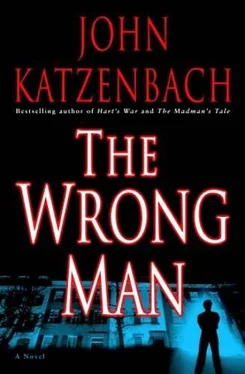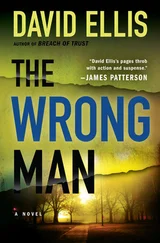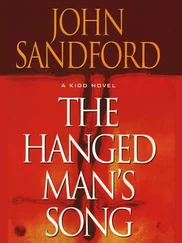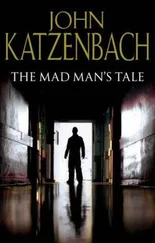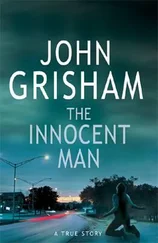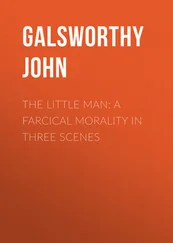
John Katzenbach
The Wrong Man
The History Professor and the Two Women
When Scott Freeman first read the letter that he found in his daughter’s top bureau drawer, crumpled up and stuffed behind some old white athletic socks, he knew immediately that someone was going to die.
It was not the sort of sensation that he could instantly have defined, but it overcame him in much the same way that any feeling of impending dread might, finding a distinct cold place deep within his chest. He remained rooted in his place, while his eyes repeatedly traveled the words on the sheet of paper: No one could ever love you like I do. No one ever will. We were meant for each other and nothing will prevent that. Nothing. We will be together forever. One way or another.
The letter was not signed.
It had been typed on common computer paper. The type font had been italicized, to give it an almost antique sensitivity. He could not find the envelope that it had been delivered in, so there was no handy return address, not even a postmark that he could check. He put the letter down on the bureau and tried to smooth out the creases that gave it an angry, urgent appearance. He looked again at the words and tried to imagine them to be benign. A puppylike protest of love, nothing more than a temporary infatuation on the part of some college classmate of Ashley’s, a crush, and that she had kept it concealed for no real reason, other than some misplaced romantic foolishness. Really, he told himself, you are overreacting.
But nothing he imagined in that moment could overcome the sensation icing him inside.
Scott Freeman did not think of himself as a rash man, nor was he quick to anger, or prone to swift decisions. He liked to consider every facet of any choice, peering at each aspect of his life as if it were the edge of a diamond, examined under a microscope. He was an academic both in trade and nature; he wore his hair shaggy-long, to remind himself of his youth in the late sixties, liked to wear jeans and sneakers and a well-worn corduroy sports coat that had leather patches on the elbows. He wore one set of glasses for reading, another for driving, and he was always careful to have both pairs with him at all times. He kept fit by a daily dedication to exercise, often running outdoors when the weather was suitable, moving inside to a treadmill for the long New England winters. He did this, in part, to compensate for the occasions when he would drink heavily alone, sometimes mixing a marijuana cigarette with Scotch on the rocks. Scott took pride in his teaching, which allowed him a certain daily flamboyant showmanship when he looked out across a packed auditorium. He loved his field of study and looked forward to each September with enthusiasm, and little of the cynicism that afflicted many of his colleagues at the college. He thought he had the most steady of lives and feared that he put too much excitement in the details of the past, so occasionally he indulged in some contradictory behavior: a ten-year-old Porsche 911 that he drove every day unless it snowed, rock and roll blaring from the stereo. He kept a battered, old pickup truck for the winters. He had an occasional affair, but only with women near his own age, who were more realistic in their expectations, saving his passions for the Red Sox, the Patriots, the Celtics, and the Bruins, and all the college’s sports teams.
He believed that he was a man of routine, and sometimes he thought that he’d had but three real adventures in his adult life: Once, while kayaking with some friends along the rocky Maine coast, he’d been separated from his companions by a strong current and sudden fog and found himself floating for hours in a gray soup of quiet; the only noise surrounding him had been the lapping of the wavelets against the plastic kayak sides, and the occasional sucking sound of a seal or porpoise surfacing close by. The cold and damp had enveloped him, creeping closer, dimming his vision. He had understood that he was in danger, and that the extent of his trouble might be far greater than he could imagine, but he’d kept calm and waited until a coast guard boat had emerged from the vaporous mist that had enclosed him. The captain had pointed out that he’d only been yards away from a powerful offshore current that in all likelihood would have swept him seaward, and so he became significantly more frightened after his rescue than he’d been when he’d actually been at risk.
That had been one adventure. The other two were of greater duration. When Scott was eighteen and a freshman in college in 1968, he had refused to obtain a student deferment from the draft, because he felt it morally unacceptable to allow others to be exposed to dangers that he was unwilling to share. This heady romanticism had sounded high-minded at the time, but had been eviscerated by the arrival of a letter from the draft board. In short order he’d found himself drafted, trained, and on his way to a combat support unit in Vietnam. For eleven months he’d served in an artillery unit. His job had been to relay coordinates received over the radio to the fire mission commander, who would adjust the height and distance on the battery of guns, then order the rounds released with a great whooshing sound that always seemed much deeper and more profound than any thunderclap. Later, he had nightmares about being a part of killing beyond his sight, beyond his reach, almost out of his hearing, wondering, when he’d awakened in the deep of night, if he had killed dozens, maybe hundreds, or perhaps no one. He’d rotated home after a year, never once having actually fired a weapon at anyone he could see.
After his service, he’d avoided the politics that gripped the nation and delved into his studies with a single-mindedness that surprised even himself. After seeing war, or, at least, an aspect of it, history comforted him, its decisions already made, its passions reverberating in time passed. He did not speak of his time in the military and now, middle-aged and carrying a degree of tenured respect, doubted that any of his colleagues knew he’d been a part of the war. In truth, it often seemed to him as if it had been a dream, perhaps a nightmare, and he’d come to think that his year of conflict and death only barely existed.
His third adventure, he knew, had been Ashley.
Scott Freeman took the letter in his hand and went over and sat down on the edge of Ashley’s bed. It had three pillows on it, one of which, inscribed with a needlepoint heart, he’d given her on Valentine’s Day more than ten years earlier. There were also two stuffed bears, which she’d named Alphonse and Gaston, and a frayed quilt, which had been given her when she was born. Scott looked at the quilt and remembered that it had been a small joke, in the weeks before Ashley’s birth, when both her prospective grandmothers had given the child-to-be quilts. The other one, he knew, was on a similar bed, in a similar room, at her mother’s house.
His eyes traveled over the rest of the room. Photographs of Ashley and friends taped to one wall; knickknacks; handwritten notes in the flowing, precise script of teenage girls. There were posters of athletes and poets, a framed poem by William Butler Yeats that ended with the words I sigh that kiss you, for I must own, that I shall miss you when you have grown, which he’d given her on her fifth birthday, and which he’d often whispered to her as she fell into sleep. There were photographs of her various soccer and softball teams, and a framed prom picture, taken in that precise moment of teenage perfection, when her dress clung to her every newfound curve, her hair dropped perfectly to her bare shoulders, and her skin glowed. Scott Freeman realized that what he was looking out upon was the collected stuff of memories, childhood documented in typical fashion, probably no different from any other young person’s room, but unique in its own way. An archaeology of growing up.
Читать дальше
